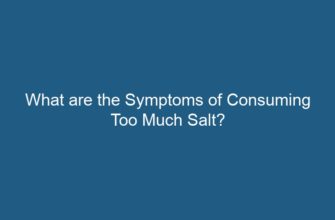A heart attack, also known as a myocardial infarction, is a serious medical condition that occurs when the blood flow to a part of the heart is blocked, usually by a blood clot. This lack of blood flow can cause damage or death to the heart muscle.
- Understanding a heart attack
- Common symptoms of a heart attack
- The connection between hand numbness and a heart attack
- Why does hand numbness occur?
- Which hand is more commonly affected?
- Frequently Asked Questions (FAQs)
- 1. Can hand numbness be the only symptom of a heart attack?
- 2. Can a heart attack occur without any symptoms?
- 3. Are women more likely to experience hand numbness during a heart attack?
- 4. Can anxiety or panic attacks cause hand numbness?
- 5. How is a heart attack diagnosed?
- 6. What can be done to prevent a heart attack?
- Conclusion
Understanding a heart attack
Before delving into which hand may go numb during a heart attack, it is important to understand the basics of this life-threatening event. A heart attack occurs when the coronary arteries, which supply blood to the heart muscle, become blocked or narrowed due to the buildup of plaque. This blockage prevents oxygen-rich blood from reaching the heart, leading to tissue damage.
Common symptoms of a heart attack
Heart attack symptoms can vary from person to person, but there are some common signs to be aware of. These symptoms typically include:
- Chest pain or discomfort: This is often described as a feeling of pressure, squeezing, or fullness in the chest. It may last for a few minutes or come and go.
- Pain or discomfort in other areas of the upper body: This can include the arms, back, neck, jaw, or stomach.
- Shortness of breath: Feeling breathless or having difficulty breathing can be a sign of a heart attack.
- Feeling lightheaded or dizzy: Some individuals may experience a sense of dizziness or fainting during a heart attack.
- Nausea or vomiting: These symptoms can occur, especially in women.
- Cold sweat: Profuse sweating without any apparent reason can be a symptom of a heart attack.
The connection between hand numbness and a heart attack
While chest pain is the most common symptom of a heart attack, some individuals may also experience numbness or tingling in one or both arms. This sensation can extend from the shoulder down to the fingers. However, it is important to note that not everyone will experience hand numbness during a heart attack.
Why does hand numbness occur?
The occurrence of hand numbness during a heart attack is related to the nerve pathways that transmit signals from the heart to the brain. The nerves that supply the heart also branch out to the arms and hands. When the heart muscle is damaged or deprived of oxygen, it can send abnormal signals through these nerves, leading to the sensation of numbness or tingling in the hands.
Which hand is more commonly affected?
In most cases, if hand numbness occurs during a heart attack, it is more likely to affect the left hand. This is because the nerve pathways from the heart that lead to the left arm and hand are more commonly involved. However, it is important to emphasize that the presence or absence of hand numbness does not definitively indicate a heart attack. It is crucial to consider all other symptoms and seek immediate medical attention if a heart attack is suspected.
Other factors to consider
It is worth mentioning that hand numbness can also occur due to other reasons unrelated to a heart attack. Conditions such as carpal tunnel syndrome, nerve compression, or even a pinched nerve in the neck or shoulder can lead to similar symptoms. Therefore, a proper medical evaluation is necessary to determine the exact cause of hand numbness.
When to seek medical help
If you or someone else experiences symptoms suggestive of a heart attack, it is crucial to seek immediate medical help. Time is of the essence when it comes to heart attacks, and receiving prompt medical treatment can significantly improve the chances of survival and minimize long-term complications.
Frequently Asked Questions (FAQs)
1. Can hand numbness be the only symptom of a heart attack?
No, hand numbness is not typically the only symptom of a heart attack. It is often accompanied by other symptoms such as chest pain or discomfort, shortness of breath, and pain in other areas of the upper body. However, it is important to note that not everyone experiences the same set of symptoms during a heart attack.
2. Can a heart attack occur without any symptoms?
Yes, in some cases, a heart attack can occur without any noticeable symptoms. These are known as silent heart attacks and are more common in individuals with diabetes or older adults. Regular check-ups, including cardiac screenings, can help detect any underlying heart issues, even in the absence of symptoms.
3. Are women more likely to experience hand numbness during a heart attack?
While both men and women can experience hand numbness during a heart attack, studies suggest that women may be more likely to experience atypical symptoms, including hand numbness. Women also tend to have a higher likelihood of experiencing heart attack symptoms other than chest pain.
4. Can anxiety or panic attacks cause hand numbness?
Yes, anxiety or panic attacks can cause hand numbness due to the body’s natural stress response. During periods of heightened anxiety, the body releases stress hormones that can cause various physical symptoms, including numbness or tingling in the extremities. However, it is important to rule out other potential causes, especially in individuals at risk for heart disease.
5. How is a heart attack diagnosed?
A heart attack is typically diagnosed through a combination of medical history, physical examination, and diagnostic tests. These tests may include an electrocardiogram (ECG), blood tests to measure cardiac enzymes, and imaging tests such as a coronary angiogram or cardiac MRI.
6. What can be done to prevent a heart attack?
Preventing a heart attack involves adopting a heart-healthy lifestyle. This includes regular exercise, maintaining a healthy weight, eating a balanced diet low in saturated fats and cholesterol, avoiding smoking, managing stress levels, and controlling conditions such as high blood pressure, diabetes, and high cholesterol.
Conclusion
While hand numbness can occur during a heart attack, it is important to recognize that it is not the only symptom and may not be present in all cases. Chest pain or discomfort is the most common symptom, and immediate medical attention should be sought if a heart attack is suspected. Proper diagnosis and evaluation by a healthcare professional are essential to determine the underlying cause of hand numbness and provide appropriate treatment.










